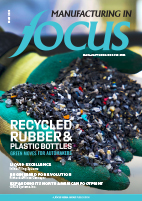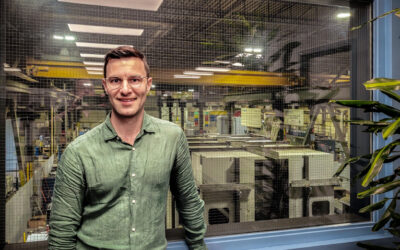While the COVID-19 pandemic has created insecurity and declining production in many areas of manufacturing, Next Generation Manufacturing Canada is taking the lead in forging new and creative pathways to long-term success.
NGen brings companies together. It links companies, researchers and investors so they can efficiently collaborate to develop new manufacturing technologies, invent or refine production processes, adapt better to demand and market conditions, and create reliable domestic supply chains.
This proudly Canadian organization is dedicated to securing and distributing funding for a wide variety of advanced manufacturing projects, encouraging synergy between disparate companies, and merging unique skill sets for greater creativity and so the greater good of society.
With its main objectives and principles centred on creating a flourishing advanced manufacturing landscape in Canada, NGen’s numerous projects connect large companies, SMEs, research organizations and learning institutions to develop world-leading manufacturing capabilities in Canada, while combining considerable talent from across the country.
As a not-for profit organization, NGen is leading Canada’s advanced manufacturing superclusters, explains CEO Jay Myers. The supercluster initiative is one of five funded by the federal government focusing on applications of technology in key sectors of the economy.
“The real objective of NGen is to build world-leading advanced manufacturing capabilities in Canada, and we do that by focusing on putting together collaborative initiatives to either accelerate the development of new manufacturing processes, the adoption of technologies to transform existing manufacturing processes, or the scale-up of new manufacturing technologies,” says Myers.
The ambition that NGen can leverage the whole of Canada’s technology, research and manufacturing strengths and build collaborating initiatives around that, will help the organization generate more value for the economy and achieve important outcomes in terms of healthcare, environmental protection, and supply chain security.
Leading the world
NGen ultimately measures its success on the basis of economic outcomes achieved, the number of jobs created, the GDP that’s added as a result of the projects, the IP created, and new companies created.
“Our experience has been that you don’t achieve world-leading capabilities unless there’s some form of collaboration, because it’s pretty clear that no one company has all the resources needed to develop world-leading advanced manufacturing capabilities that are truly unique,” he says. This is why collaboration among technology companies, manufacturers, and research centres is so important.
NGen has also seen those capabilities go well beyond achieving only successful economic outcomes. In many cases they support projects that help save lives, protect the environment and achieve other impressive goals as well.
Myers explains that NGen has four basic tenets, starting with promoting Canada’s advanced manufacturing capabilities.
“We have tremendous technology, research and manufacturing capabilities,” he shares. “We want to make sure that more businesses and more Canadians are aware of this, but also promote things around the world.”
The second is focusing on connecting and strengthening collaboration among the technology companies, researchers and manufacturers, and building those collaborative partnerships.
Third is strengthening or enhancing the ability of smaller companies in particular, either to manage the adoption of new technology or the scale-up of new technology, focusing on everything from project management through to the ability to manage innovation and technology to improve business outcomes.
“We have a number of education programs that we’re setting up, peer-to-peer discussion, and some virtual plant tours to showcase best practice,” says Myers.
Finally, NGen works to fund projects that are world-leading, transformative and collaborative, contributing to Canada’s advanced manufacturing ecosystem.
“We’re using the supercluster funding as seed funding, because I think our ability to build transformative world-leading capabilities through collaborative projects is extremely important for Canada,” says Myers.
Finding the funding
NGen will also look at other sources of investment, either from public-run funding organizations, or private investors. “This idea about being collaborative and bringing together resources to develop unique solutions for a manufacturing company really generates a lot more value than what each company brings on its own.”
NGen was notified of receiving supercluster funding in 2018, and spent most of last year setting up the processes and the rules around eligibility of funding, and also expanding its membership. With close to 3,000 members across Canada, the organization is building its networks, connecting with companies and trying to understand their unique capabilities.
When COVID-19 hit in March, NGen was one of the first government-supported funding organizations to focus on projects delivering critical products to fight the pandemic in the short term.
“That happened because we had the good processes in place, and the network that we’d built allowed us to pivot so rapidly to support those projects,” says Myers. “We’re still focusing on projects, and now it’s how do we position ourselves to become part of Canada’s economic recovery as well as fighting COVID.”
The onset of the pandemic aggravated many of the challenges manufacturers around the world were already facing, and accelerated companies into adopting more in terms of advanced technologies. “I think that’s become very important in light of COVID,” says Myers. “It’s also presented some really interesting new supply chain opportunities for Canadian manufacturers.”
A time for flexibility
The adoption of advanced manufacturing capabilities and processes make a company more sustainable economically and able to adapt to fluctuations in demand and supply, says CTO John Laughlin. “When COVID-19 hit, on one side there was a huge surge for specific products, with a demand we struggled to match, but there was also a big slowdown and lack of demand for other products,” he says.
More automation can mean more flexibility in operations to meet the flux of demand and supply, which builds valuable resilience into the supply chain, but it’s also important to think about the whole supply network.
“Transparency in the supply chain is essential, and knowing where you fit, upstream or downstream in the supply network is really important,” says Laughlin. “It just takes one disruption in one part of the supply chain for the whole chain to fall apart.”
Companies also need to think about how products are distributed, he adds, including the importance of the whole life cycle and the environmental impact of a manufacturing footprint, no matter where that supply chain is.
“We have global supply chains across all sectors, but having that transparency and understanding of the environmental impact within the supply chain itself is really critical.”
Meeting the challenge
While the pandemic has brought with it any number of unique trials and tribulations, NGen remains open for business, having approved 60 projects to date with $216 million in project costs. The company has also set up a number of challenges with specific targets, themes, and set timelines. Within 24 hours of the pandemic hitting, NGen started working together with companies to immediately supply the critical products needed, whether it was n95 filtration materials, or antimicrobial coatings.
The agility of the manufacturing sector was vital to Canada’s pandemic response and allowed many companies to successfully pivot to making PPE and critical supplies. “Firms that rapidly applied their manufacturing capabilities started to grow their business and their market share. In certain cases, organizations even built out additional facilities and hired more staff.”
NGen’s third challenge looks at building a globally sustainable, economically stable supply of critical products still needed, whether it is PPE or other vital products and materials to fight the pandemic.
“We put the challenge out to companies to come with projects that could show a sustainable, economic plan to supply some of these products in Canada, not just for the short term, but with the impact to be felt in coming months as we fight COVID-19,” says Laughlin.
The secondary goal addresses flexibility and resilience within the supply chain, and reconfigurability of supply chains and transparency.
“The thing about advanced automation is that you can reduce the amount of workers that are in close proximity on production lines, and retrain them so it’s a safer working environment,” says Laughlin.
Having higher value jobs that are more competitive means a higher market share, and more jobs overall in a safer environment. Disrupting supply chains and stopping and starting production is complex and costly, so there are potential opportunities to help model those scenarios for plants.
NGen has a wide range of funding streams available from $50,000 feasibility studies up to $20 million complex advanced manufacturing projects. NGen targets its funding toward manufacturers and technology companies to support the development of advanced manufacturing technologies and processes.
“We have developed these funding streams to support companies of all sizes from SMEs to major multinationals, while supporting the development and ownership of Canadian IP,” says Laughlin.
Manufacturing ‘not as you know it’
NGen works nationally, building networks and pulling the best companies across the country together to work on a variety of issues, including one company that fights cancers and late-stage diseases.
“It’s manufacturing not as you know it,” says Laughlin. “It’s really high-tech, and the goal of the project is to develop a robust manufacturing platform that can meet the global demand for these critical reagents, all while attracting and retaining highly educated talent in Canada and building the Canadian cell and gene therapy ecosystem.”
While it’s critical to be competitive, says Laughlin, collaboration allows NGen to work with manufacturers to understand their problems in order to find the technology to help them solve those problems.
“It’s learning that can be diffused throughout the country,” he says. “It’s not just about Dofasco getting a new process or IBM developing something new; it’s about that knowledge being shared for the greater benefit of Canada, not just one company.”
NGen remains dedicated to enabling and funding companies to spread that knowledge and leave a legacy in advanced manufacturing in Canada so that the reach and longevity of this knowledge is embedded for the benefit of future manufacturers and technology.
High-value jobs
While people fear that these advances in manufacturing take jobs away, Laughlin says that couldn’t be further from the truth.
“It makes you more competitive, gives you a bigger slice of the market share and creates high-value jobs. I think if that awareness is raised, it will have a greater impact.”
NGen’s latest challenge concerns the adoption of the technology and how it can be competitive with the right mix, right business practices, and right solutions. “Although we have a relatively small domestic market and are not as low-cost as other countries, deploying these technologies and capabilities correctly really is the way to go,” says Laughlin.
Environmental impact is also extremely important, Laughlin stresses.
“We need to really understand the life cycle considerations of manufacturing. For a long time, people have overlooked the source of products from other countries. Not all countries have the same considerations of emissions, or ethical use of labour. There’s a lot of water usage and land degradation, and there may be high social impacts to get a low-cost product, and a lot of supply chains turn the blind eye to that.”
A step ahead for Canada
Moving forward, Laughlin says companies need to be cognizant of the emissions impact, land degradation, and social impact of manufacturing footprints: “There’s a huge opportunity in low emissions and green manufacturing for Canada to step ahead with some of the technologies needed to have those green footprint solutions.”
That’s where NGen can encourage the use of advanced manufacturing capabilities to reduce emissions and the total environmental impact of natural resources, he says. While it may take some time, as awareness rises, the public will want and perhaps demand more transparency.
“And that’s where Canada can be so strong!” says Laughlin. “Canada is a country that won’t turn a blind eye to the ethical use of technology.”
Ultimately, according to NGen, the willingness to change and embrace new technologies, while collaborating openly with other companies for the betterment of all, will serve to improve companies — and communities — in the long run.
“If you’re going to go into a new area of manufacturing, you have to be globally competitive,” says Myers. “I think that’s where the focus on advanced manufacturing really comes into play. It’s a combination of the right technologies, but also the right management processes, the right strategy, and of course the right skill sets. All of that’s very important.”













